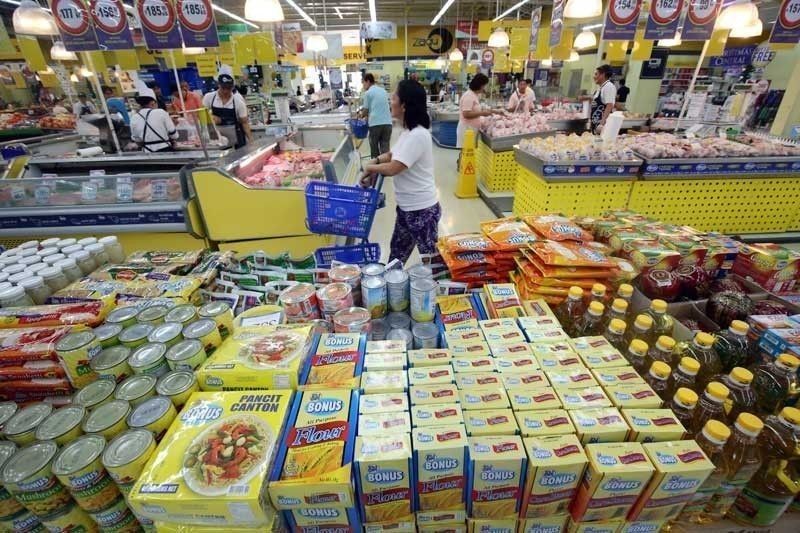Inflation likely to peak toward end of 2018 — BSP

MANILA, Philippines — Inflation may remain elevated until toward the end of the year due to rising oil prices as well as the second round effects of the tax reform law, according to the Bangko Sentral ng Pilipinas.
BSP Deputy Governor Diwa Guinigundo said inflation is now expected to peak toward the end of the year instead of the third quarter.
“Maybe toward the end of 2018,” Guinigundo replied when asked when inflation would reach its peak this year.
The central bank raised its inflation forecast to 4.6 for this year and to 3.4 percent for next year.
The BSP has set an inflation target of two to four percent between 2018 and 2020. Inflation already averaged 4.1 percent from January to April this year.
The consumer price index (CPI) rose to a fresh five-year high of 4.5 percent in April from 4.3 percent in March due to higher oil prices and the initial impact of the implementation of Republic Act 10963 or the Tax Reform for Acceleration and Inclusion (TRAIN) Law.
Guinigundo said the BSP has considered the impact of the expected gain in domestic economic activity starting the second and fourth quarter of the year after the economy grew by 6.8 percent in the first quarter from 6.5 percent in the fourth quarter.
He said global oil prices are expected to rise to $67.84 per barrel this year.
“Crude oil has gone up versus 2017 and we expect that in June 2018 we will continue to see elevated readings of oil prices at about $70 per barrel,” he said.
Guinigundo said the central bank expects to see some adjustment in the minimum wage in October as it has considered an P18 or 3.6 percent average increase in the minimum wage.
“Anything beyond that is a risk, but we expect that based on the experiences in the past the actual wage adjustment that was approved by the regional productivity wage boards were much lower compared to the original petitions of the labor sector,” he said.
According to Guinigundo, another factor is the imposition of an additional excise tax of P2.50 per pack on tobacco products starting July.
The BSP raised its interest rates by 25 basis points last May 10 as inflation forcasts have shifted higher, indicating that inflation pressures could become more broad-based over the policy horizon.
The central bank said the balance of risks to the inflation outlook continues to lead toward the upside, with price pressures emanating from possible adjustments in transport fares, utility rates, and wages.
However, Guinigundo said things could change between now and the next meeting of the BSP’s Monetary Board on June 21.
“Oil prices can move up or down, wage demand can either expand in terms of the number of petitions filed or the public or concerned households will be encouraged by the receipt of unconditional cash transfers and the fact that some of them also benefited from the favorable restructuring of personal income tax,” he said.
Meanwhile, the National Economic and Development Authority (NEDA) expects inflation to peak in the first semester but still stay within the four percent level.
Inflation, the measure of movements in prices of goods and services in the country, rose at a faster pace of 4.5 percent in April from 4.3 percent in March and 3.2 percent in April 2017.
NEDA Undersecretary Rosemarie Edillon said inflation is expected to reach its highest for 2018 this month.
“We think, in May. This first half of the year we will see the (inflation) push (influenced) by TRAIN (Tax Reform for Acceleration and Inclusion), after which it will go down,” she said in a recent interview.
“At first, of course there is a knee-jerk reaction and then firms will adjust their prices,” she added.
She cited that among the immediate solutions to bring more lasting relief from price spikes include structural reforms such as the replacement of the quantitative restriction (QR) on rice with tariffication to boost supply and drive down prices significantly. The lifting of the QRs on rice is expected to reduce the retail price of rice by P4 to P7 per kilogram.
Socioeconomic Planning Secretary Ernesto Pernia said NEDA has appealed to President Duterte to order the passage of amendments to the Agricultural Tariffication Act to remove the special tax treatment in rice.
NEDA proposes to restructure the National Food Authority (NFA) to remove its monopoly on importation and trading of rice so it can focus on buffer stocking to meet emergencies.
Edillon also said earlier that productivity enhancing measures need to be immediately implemented in the agriculture sector by way of improved post-harvest measures, transportation and logistic networks.
The sector, she said, must also have greater access to innovative technologies and credit programs and crop insurance to improve the resilience of farmers and fisherfolk. – With Czeriza Valencia
- Latest
- Trending





























